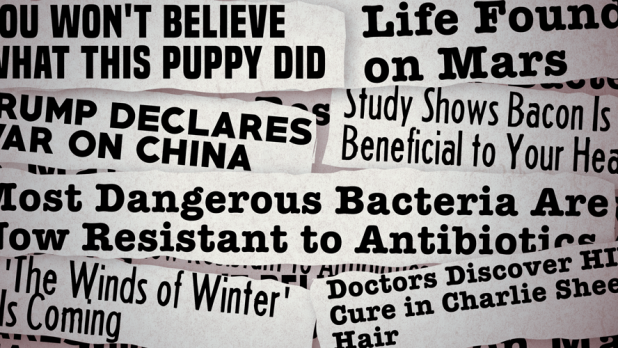Headlines are everything. They frame the way we read an article, how we remember it, and whether we choose to read it in the first place. In the world of click-bait journalism, authors have become experts at crafting headlines to maximum effect – even if it means lying or at least misleading. This dangerous trend distorts the news and the way we read it. Science and health articles are no exception (for fun you should try these techniques with political headlines as well).
Let’s look at some survival strategies for reading headlines.
Headline: Heavy drinking may increase ‘bad’ bacteria in your mouth, study finds.
Discussion: Typically, any headline that uses words like ‘may,’ ‘might,’ or ‘could’ will present an articles that will go on to make wild claims about questionable data. This particular article uses statistically tenuous data to make bold claims about the pathophysiology of alcohol and heart disease. The connections are not supported by the data presented. The headline was written to get clicks and few readers will realize that the assertions presented in the text are completely unsupported by the data cited. But the author has avoided outright dishonesty by using verbs that imply conditionality and probability.
Here’s a true statement: I may be the King of Norway someday.
Words like ‘may’ and ‘may not’ can be substituted in a headline without changing its truthfulness. So, “Study finds that low Vitamin D might be linked to autism” is the same thing as “Study finds that low Vitamin D might not be linked to autism.” The same weight of evidence supports either headline. The choice in headline depends on the author’s narrative and agenda.
Headline: Could baking soda be the key to fighting autoimmune disease?
Discussion: When a headline ends in a question mark, the answer is almost always ‘no.’ If baking soda were the key, then the headline would be “Baking soda is the key to fighting autoimmune disease.” These types of ‘yes-no’ question headlines are a rhetorical device designed to lure the reader. This is so commonplace it even has a name: Betteridge’s law of headlines. Hinchliffe’s rule says that if a research article ends in a question mark that begs a yes or no answer, the answer is almost always ‘no.’
Here are some other examples:
- Can Caffeine During Pregnancy Raise Kids’ Weight? No. If the evidence existed, it would state: ‘Caffeine During Pregnancy Raises Kids’ Weight.’
- Could caffeine be good for your heart? No. At least not in light of current evidence. If the evidence were there, the headline would read, “Caffeine is good for your heart.”
- Is caffeine bad for your heart? Hmm. Irony. No, except maybe for arrhythmias.
- Can your diet delay menopause? Almost certainly not. Diet-related studies are almost universally incorrect.
- Is Age At Menarche Associated With Total Mortality? Nope. Well, actually yes. Every woman who has ever had menarche will die, so I guess it is associated with total mortality.
- Does apple cider vinegar have any proven health benefits? No. NO. NOOOOOO.
Headline: Couples’ Caffeine Use Linked to Higher Risk of Miscarriage.
Discussion: Anytime you see a headline that uses the words ‘linked to’ or ‘associated with,’ substitute the phrase ‘probably doesn’t cause.’ So, for the above headline, read: “Couples’ Caffeine Use Probably Doesn’t Cause Higher Risk of Miscarriage.”
Most newly published studies are poorly designed, retrospective studies that look for associations between variables. Even when the discovered associations are true (they usually aren’t), that still doesn’t mean that correlation equals causation; in fact, almost all correlations ever discovered have no causative association. For example, The Divorce Rate in Maine is Strongly Associated with the Per Capita Consumption of Margarine. It is incredibly unlikely that any given discovered association actually reflects a causal relationship. If the science supported causation, the headline would use the word ’causes.’
So try this:
- Preoperative Vitamin D Deficiency Is Associated With Higher Postoperative Complication Rates in Total Knee Arthroplasty. Read instead: Preoperative Vitamin D Deficiency Probably Doesn’t Cause Higher Postoperative Complication Rates in Total Knee Arthroplasty.
- Anxiety in middle age linked to dementia later. Read instead: Anxiety in middle age is probably not a cause of dementia later.
Honestly, just stop reading all studies that talk about correlations. Those studies should be done to inform other prospective, controlled studies. But people read them and assume causation and act accordingly. This is not science, it is click-bait, tenure-stealing garbage.
Headline: 5 Anti-aging snacks for people on the go.
Discussion: Don’t even click on it. This headline promises way too much and is a de facto lie. This falls into the “too good to be true” category. We don’t have anti-aging snacks. Also, don’t click on any headline that mentions detoxes, cleanses, one neat trick, superfoods, etc. There are just some things that are obviously cons but unfortunately people are drawn to them like moths to a fire. Here are some more examples of things you shouldn’t even bother with:
- The best anti-aging products for people with rosacea (that won’t irritate skin). Again, promises way too much, clearly has something to sell.
- 18 Superfoods for Your Heart. Nope. Please don’t ever click on a link that mentions superfoods. They don’t exist. Not a thing. Also, skip the ones that mention anything organic.
- Try a one month sugar detox. Don’t click. You probably do need to cut down on how much sugar you eat, but don’t get advice about that from someone who uses the word detox in the headline.
I could go on, but you get the point. For more information about how the media is ruining science, check out this article called The Media Is Ruining Science. Now that’s a good headline. And check out this classic Howardisms about how the media and industry take advantage of people.

